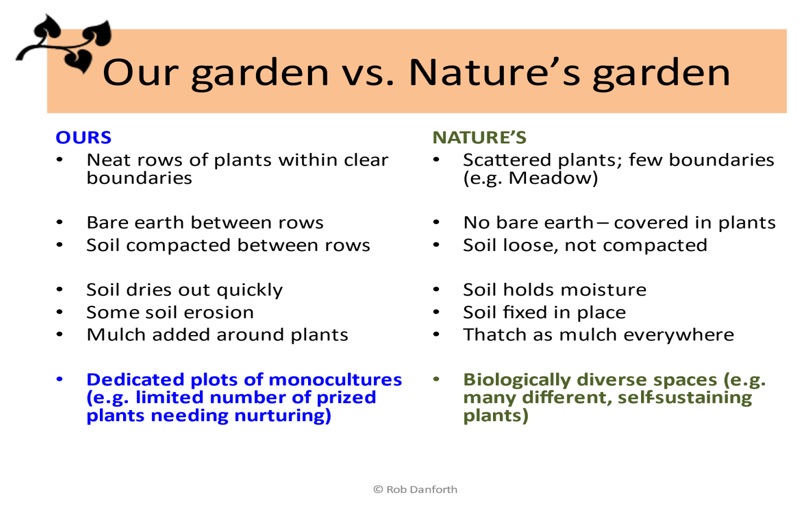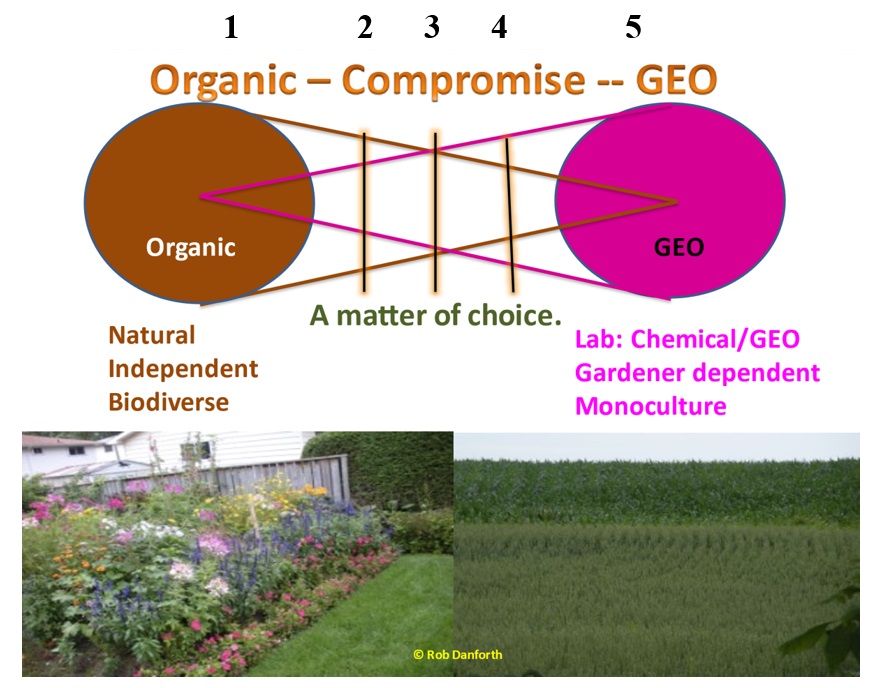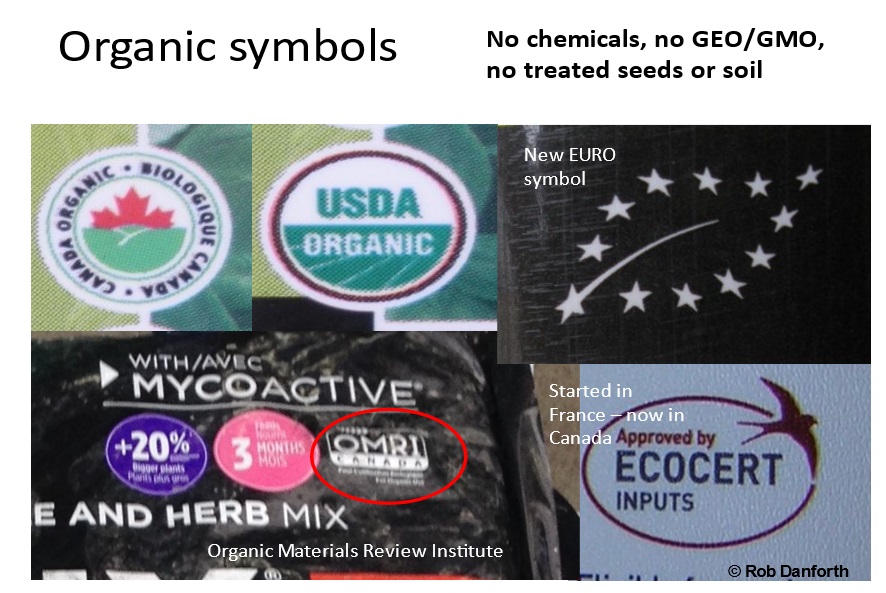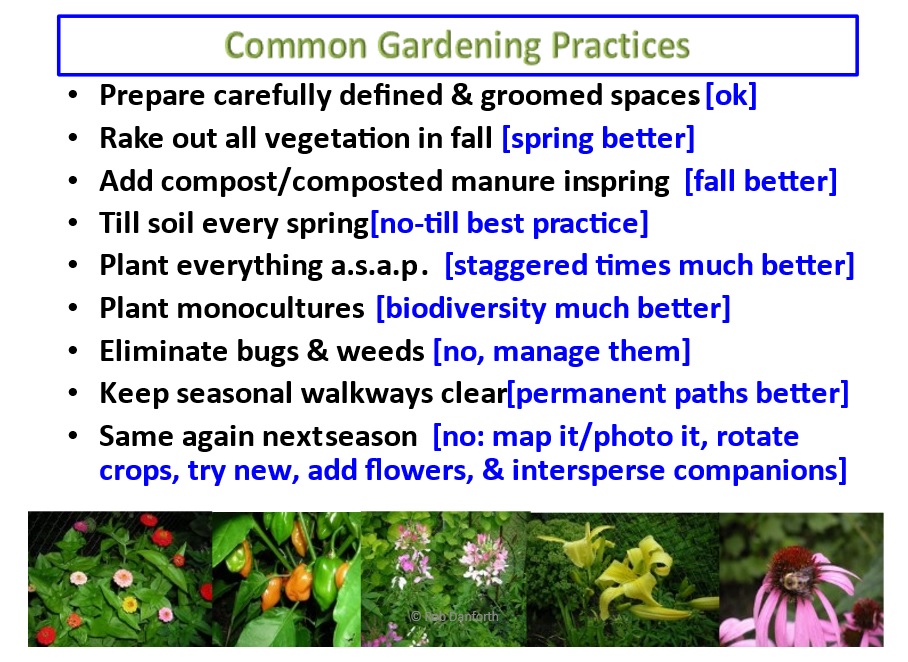The DTE Notebook for the Urban Organic Vegetable and Herb Gardener.
Why bother with Organics?
Article and photos by Rob Danforth
Organic gardening is an attitude and a methodology applied to food and flower gardens, and even to your lawn. The word “Organic” in and of itself does not mean safe food or safe environment, — many “organic plants” like poison ivy can hurt and even kill a person — but organic gardeners strive to work with nature rather than against nature without the intervention of synthetic chemicals so that nature can be sustained and kept healthy and we can all share in the benefits. I stress that the following views are my understanding of organics and open to discussion – I do not speak for any organization, nor do I speak to or for farmers.
In the past, mankind’s attitude to nature was that it was wild and needed to be tamed and even subjugated for our pleasures, conveniences, and food. Nature was seen as a force that needed to be brought to heel and a commodity to be marketed. In the 70’s I used so many Chemicals.
Today we see that eliminating aspects of nature can have a cascading effect on a whole host of organisms as well as on us – what goes around comes around! At the end of the day, Nature is a fabric with all things interwoven. Pull one thread, and many others are disrupted, often where we least expect. We affect that fabric and we are greatly affected by it. It is best to live in and with nature – nature is very good at rapping our knuckles when we take it for granted or refuse to listen to nature’s feedback. Sadly, in our heyday to control or to ignore nature, we have caused serious problems with the atmosphere, water resources, soils, flora, and fauna.
If you wish to embrace organics whole or in part, here is some information that might help:

Be as organic as you can be! Organic practices offer
- chemical free foods & working environments.
- fewer allergic reactions.
- no dedicated equipment reserved for oils, chemicals, and poisons.
- no hazmat suit, facemask, or eye protection.
- no environmental pollution or adverse effects on nature.
- no controversial GMO/GEO (Genetically Engineered Organisms).

The interlocking gyres above illustrate the extremes of the pendulum swing. My brother-in-law’s vegetables are hiding in those flowers and weeds are few due to high density and diverse planting. The next field is weed free because of GEO and chemical herbicides. The only weeds are in the roadside ditch. As gardeners, we can choose to be 1 organic, 2 mostly organic, 3 somewhat organic, 4 a little organic, or 5 not organic at all. I deliberately chose the centers of the circles to illustrate that there may be a little organic in the non-organic as well as a little non-organic in the organic for all non-certified, urban, organic gardeners. It is difficult to be 100% pure either way.
Urban Organic Garden Guidelines: observe, listen to, and imitate nature.
- Take care of the soil, the foundation of all successful gardening – it changes over time and will become exhausted as plants consume nutrients.
- Encourage the helpful critters and insects which can work on your behalf to manage the harmful insects, assist in your composting, and pollinate your flowers.
- Manage, do not eliminate the harmful insects, diseases, weeds, and critters to preserve nature’s cycle: in nature’s fabric, one’s irritation is another’s food (e.g., mosquitos pollinate, annoy people, and feed the dragonflies).
- Reuse & recycle as much as possible, avoiding single use material (e.g., plastics, wrappings, bindings, containers, …).
- Do not use chemicals (herbicides, pesticides, fungicides, anti-bacterial solutions, synthetic fertilizers, treated seeds, treated wood), GMO’s/GEO’s, or sewage sludge.
To purchase or to check for certified organic products, look for the following symbols on the packaging:

For a more advanced search (and more complicated), you can check the Canadian government web site or see the Organic Materials Review Institute (OMRI). However, please note that the American OMRI is a little different from the Canadian one – we are good friends, but we do not agree on all things.

Happy Gardening, however organic you choose to be.